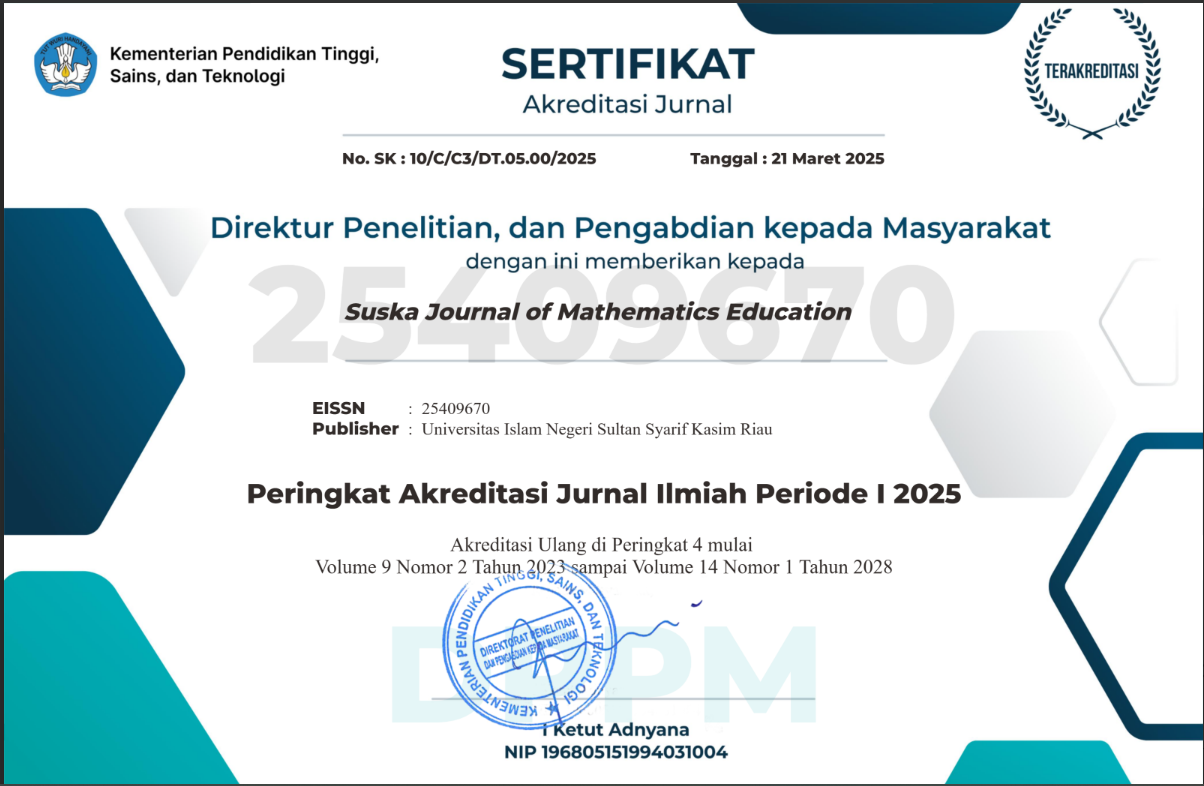Meningkatkan Hasil Belajar Matematika melalui Pembelajaran Team Assisted Individual Siswa Kelas VII-1 SMP 32 Pekanbaru
Abstract
As a mathematics teacher who taught class VII at SMP N 32 Pekanbaru. Researchers feel responsible for students' failures in learning. In class VII-1 where researchers teach, there are problems that need to be resolved, including the activities and student learning outcomes of mathematics that are very low. Some students are passive and do not want to ask if they have difficulty in learning mathematics. The students scores who reach KKM ≥ 80 is 43.8%. Based on these problems, it is necessary to improve the activities and mathematics learning outcomes of students through the cooperative learning model type Team Assisted Individualization Class VII-1 SMP N 32 Pekanbaru in 2018. The research method used is Classroom Action Research. Activities carried out include planning, implementation, observation, and reflection. The activity data is collected through observations at the end of each cycle. Data analysis using qualitative and quantitative. The results of Classroom Action research, namely from the learning outcomes in the first cycle students who complete learning from meetings 1, 2 and 3 on average are 66.7% in the second cycle increased to 87.1% up by 20.4% Learning incompleteness students are due to their lack of concrete abilities, therefore need guidance and attention from the teacher, from these results indicate that indicators of learning outcomes 75% of students who get a value of 80 have been reached in cycle 2.
Full Text:
PDFReferences
Aminah, H. S. (2017). Meningkatkan Hasil Belajar IPA melalui Model Kooperatif Tipe Jigsaw Berbantu Media Gambar Kelas IV SD. Jurnal Pendidikan Progressif, 7(2), 93–100.
Ardilla, A., & Hartanto, S. (2017). Faktor yang mempengaruhi Rendahnya Hasil Belajar Matematika Siswa MTs Iskandar Muda Batam. Phytagoras, 6(2), 175–186.
Bernas.id. (2017). Peringkat Berapakah Indonesia di TIMSS? Retrieved from https://www.bernas.id/50899-peringkat-berapakah-indonesia-di-timss.html
Gagne, R. M. (1983). Learning Outcomes and Their Effects (Useful Categories of Human Performance). American Psychologist, 39(4), 377–385.
Kurniawan, B., Wiharna, O., & Permana, T. (2017). Studi Analisis Faktor-Faktor yang Mempengaruhi Hasil Belajar pada Mata Pelajaran Teknik Listrik Dasar Otomotif. Journal of Mechanical Engineering Education, 4(2), 156–162.
Maysarah, S. (2018). Peningkatan Hasil Belajar MAtematika Siswa Melalui Strategi PAKEM di KElas VIII MTs Nurul Amaliyah Tanjung Morawa. Jurnal Tarbiyah, 25(1), 125–144.
Nadianti, R., Misdalina, & Kesumawati, N. (2018). Perbandingan Model Pembelajaran Kooperatif Tipe TAI dengan NHT dalam Kemampuan Pemahaman Konsep Matematis ditinjau dari Kemampuan Awal Siswa SMP Negeri 4 Prabumulih. Jurnal Kajian Pembelajaran Matematika, 2(April), 19–25.
Natalia, & Leonard. (2015). Pengaruh Metode Pembelajaran Team Assisted Individualization Terhadap Hasil Belajar Matematika pada Sekolah Menengah Kejuruan Darul Ma’arif Jakarta. In Seminar Nasional Pendidikan Matematika Universitas Indraprasta PGRI. Jakarta: Universitas Indraprasta PGRI.
Nuraheni, E. (2016). Indonesia’s PISA results show need to use education resources more efficiently. Retrieved from http://theconversation.com/indonesias-pisa-results-show-need-to-use-education-resources-more-efficiently-68176
Pajriana, I., & Puji Lestari. (2015). Pengaruh Metode Pembelajaran Team Assisted Individualization (TAI) terhadap Hasil belajar Matematika Siswa. Jurnal Media Pendidikan Matematika “J-MPM,” 4(2), 64–69.
Putri, M. D., Musdi, E., & Syafriandi. (2018). Pengaruh Model Pembelajarab Kooperatif Tipe Team Assisted Individualization terhadap Kemampuan Pemahaman Konsep Matematika Peserta Didik. Jurnal Pendidikan Matematika, 7(1), 24–29.
Septiana, S. W., Sunardi, & Oktavianingtyas, E. (2017). Pengaruh Hasil Belajar Matematika Terhadap Kecerdasan Emosional Siswa Kelas IX SMP Negeri 13 Jember. Kadikma, 8(1), 105–111.
Slavin, R. E. (1983). Team-Assisted Individualization: A Cooperative Learning Solution for Adaptive Instruction in Mathematics. Baltimore.
Subroto, D., & Slameto. (2015). Peningkatan Hasil Belajar Matematika Menggunakan Metode Pembelajaran Problem Solving pada Siswa Sekolah Dasar. Jurnal Pendidikan Dasar, 4(2), 79–86.
Sutriningsih, N. (2017). Penyebab Siswa Underachiever dalam Pembelajaran Matematika. Jurnal Edumath, 3(2), 148–154.
Sutrisno, V. L. P. (2016). Faktor-Faktor yang Memepengaruhi Hasil Belajar Siswa pada Pembelajaran Praktik Kelistrikan Otomotif SMK di Kota Jogjakarta. Jurnal Pendidikan Vokasi, 6(1).
Syafwan. (2013). Meningkatkan Hasil Belajar Matematika Siswa Melalui Strategi Pembelajaran Kooperatif Tipe Tutor Sebaya Untuk Siswa Kelas VII-A SMP Negeri 2 Poso Pesisir. Jurnal Kreatif Tadulako Online, 4(4), 227–238.
Tinungki, G. M. (2015). The Role of Cooperative Learning Type Team Assisted Individualization to Improve the Students ’ Mathematics Communication Ability in the Subject of Probability Theory. Journal of Education and Practice, 6(32), 27–31.
Yusuf, M. (2010). Peningkatan Hasil Belajar Matematika Siswa Melalui Lembar Kerja Siswa (LKS) Interaktif Berbasis Komputer di SMA Muhammadiyah 1 Palembang. Jurnal Pendidikan Matematika, 4(2), 34–44.
DOI: http://dx.doi.org/10.24014/sjme.v4i2.4857
Refbacks
- There are currently no refbacks.

This work is licensed under a Creative Commons Attribution-NonCommercial-ShareAlike 4.0 International License.
Published by:

FLAG COUNTER





